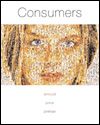 |  Consumers Eric Arnould,
University of Nebraska
George Zinkhan,
University of Georgia
Linda Price,
University of Nebraska
Experience, Learning and Knowledge
Chapter ObjectivesAfter completing this chapter, you should be able to:
I.Know the relationships among consumer experience, learning, memory, and knowledge. Be aware of the distinctions between these concepts. |
 |  |  | II.Know the different kinds of consumer experiences, their relationship to other kinds of consumer behavior, and marketing implications. |
 |  |  | III.Understand the role of anticipated consumption. Be able to provide examples and details. |
 |  |  | IV.Describe the different ways that consumers learn and understand the marketing implications. |
 |  |  | V.Distinguish between the two types of behavioral theories---classical conditioning and operant conditioning and apply these concepts to consumer behavior settings. |
 |  |  | VI.Appreciate the intricacy and diversity of human memory, and relate memory concepts to marketing actions. |
 |  |  | VII.Appreciate the role of context in shaping consumer memory and knowledge. Know the ways that context influence consumer behavior. |
|




 2002 McGraw-Hill Higher Education
2002 McGraw-Hill Higher Education